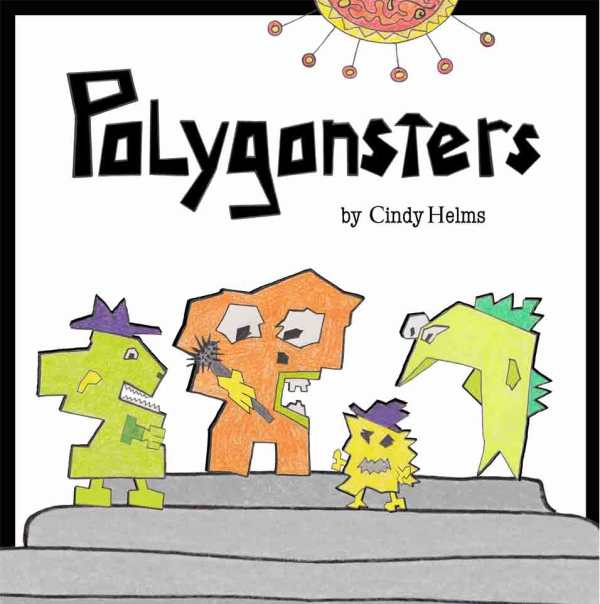Polygonsters
Delivering an important moral along with a good dose of practical advice, Polygonsters is a nice addition to the Ponderville series.
Cindy Helms returns to the fictional world of Ponderville in her charming children’s picture book Polygonsters.
Ponderville, introduced in Helms’s picture books Outside Inside and Who’s New?, is home to many strange characters. In Polygonsters, the citizens of Ponderville discover that they’re about to be visited by four even-stranger creatures who live “to the east of Ponderville, across the River Fluvia, up Rebel Mountain, and next to the sunrise.”
Through flashbacks, the Ponderville residents recall previous encounters with the Polygonsters, all of which ended in some form of destruction—to the Ponderville garden, tea house, and library. Ponderville Punk is determined to fight fire with fire this time, resolving, “We will be noisy, rowdy, greedy, rough and wild back at them.”
But the other Ponderville residents decide “we are not mean” and “we are not rude,” and they simply close the garden, tea house, and library. After the disappointed Polygonsters leave Ponderville, the residents surprise them with gifts of tea, treats, books, and flowers, despite the objections of Ponderville Punk. The book ends with the Ponderville residents happy to have been true to themselves (“We are quiet, peaceful, generous, clever and mild. And we like it that way”) and the Polygonsters enjoying their gifts at home.
Helms’s art is unique, in large part because of her chosen tools: drawing pens and colored pencils. The pencils give a rough, textured look, which contrasts nicely with the sharp, precise lines of the pen, and Helms’s layouts, set against a plain white sky, lend an appealing surreality to the proceedings.
However, Helms also repeats images and backgrounds, digitally manipulating characters or superimposing different ones. The result is somewhat distracting because of the repetition, but also because many of the manipulated images look superimposed and distinctly two-dimensional.
The writing is very simple for young audiences, but Helms keeps it fun and interesting with a bit of rhyming onomatopoeia as the Polygonsters are shown breaking up the garden (“CRASH SMASH SLASH BASH MASH”) or eating the tea and cookies (“GLURP BURP SNORT-SNURP SLURP”).
The book’s message resonates in a real-world way that preschool and kindergarten children should appreciate—though they do their best to befriend the Polygonsters, the citizens of Ponderville have learned from experience and are also careful to protect the fruits of their labor. Delivering an important moral along with a good dose of practical advice, Polygonsters is a nice addition to the Ponderville series.
Reviewed by
Peter Dabbene
Disclosure: This article is not an endorsement, but a review. The publisher of this book provided free copies of the book and paid a small fee to have their book reviewed by a professional reviewer. Foreword Reviews and Clarion Reviews make no guarantee that the publisher will receive a positive review. Foreword Magazine, Inc. is disclosing this in accordance with the Federal Trade Commission’s 16 CFR, Part 255.

